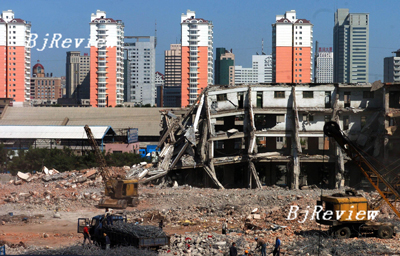
Slapping local government with a lawsuit isn't something you immediately equate with ordinary Chinese. Put it down to previous lack of awareness of people's legal and democratic rights. But times are changing. Since China released its Administrative Procedural Law in 1989, according to Beijing-based Outlook magazine, people's courts at various levels have handled more than 1 million administrative cases, with the cases in some local courts doubling in 2006.
But while the volume of cases has escalated, much doubt remains as to the fairness and timely manner in which they are handled. Most cases involve rural land expropriation, urban resettlement projects, labor and social security, and environmental protection, testimony to the theme of issues that haunt the working classes. In May, Xiao Yang, head of the Supreme People's Court, went on public record, saying that ordinary people getting involved in administrative lawsuits usually find themselves under great pressure, as they doubt whether their cases can be treated impartially. Some courts are afraid to offend local governments, as it is the local governments who appoint court officials and provide their funding, said Xiao.
"Failure to solve the administrative disputes in time will damage the dignity of the law and authority of courts, and bring loss of confidence to judicial fairness," said Xiao, who vowed to take concrete measures to address the problem.
In July, senior officials from the Supreme People's Court praised the idea of hearing the administrative cases in different locations, to avoid illegal hometown interference. The officials urged courts at various levels to be brave enough to put this suggestion into practice.
The method is not new to the Intermediate People's Court of Taizhou City, east China's Zhejiang Province, which began to use it back in 2002. In March of that year, Chen Chongguan, who was recently promoted to head of the Administrative Courtroom, became aware of the illegal interference from local government and decided to do something about it.
Four months later the administrative cases were being held in different locations amongst the nine grassroots courts under the jurisdiction of Taizhou City.
But according to China's Administrative Procedural Law, "hearing the administrative cases in different locations" can be applied only to what are deemed to be important and complicated cases. The new system, therefore, lacks sufficient backing to make it work.
Despite this drawback, it did work well. According to figures of the Intermediate People's Court of Taizhou City, of the 72 administrative lawsuits between July 2002 and June 2003, local governments lost 45 cases, or 62.5 percent of the total, in the first instance.
In April 2006, the Intermediate People's Court of Taizhou City for the first time issued a document to support the new system, and granted the plaintiffs the right to decide whether they need the case to be heard in a different location.
Local governments, however, are challenging the system, as they refuse to enforce the decree if it means they lose cases. Therefore, observers say relative laws must be amended to fully support the changing location system.
Yuan Yulai, a lawyer devoted exclusively to administrative legal cases, believes the fundamental solution to solve all the problems arising from the administrative cases is to maintain judicial independence and let judicial organs operate without interference from local governments. | 